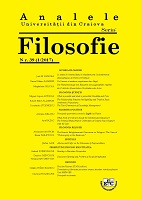WHAT KIND OF CRITICISM SHOULD THE INTELLECTUALS ENDEAVOUR? THE POLITICAL MAINSTREAM’S CELEBRATION OF OCTAVIO PAZ’S RUPTURE WITH THE LEF
WHAT KIND OF CRITICISM SHOULD THE INTELLECTUALS ENDEAVOUR? THE POLITICAL MAINSTREAM’S CELEBRATION OF OCTAVIO PAZ’S RUPTURE WITH THE LEF
Author(s): Ana BazacSubject(s): Politics, Political Philosophy, Social Philosophy
Published by: Editura Universitaria Craiova
Keywords: intellectuals; Octavio Paz; 20th century; opportunism; ideology; criticism; social conformism;
Summary/Abstract: Actually, the aim of my paper is not so much to discuss Octavio Paz’s political view, than to warn against a present tendency to celebrate the idea of rupture with the intellectual support of the popular conatus and will of human dignity and joy of life. The modern tradition has called this support left-wing, but I am not interested to use this label, or rather I use the well-known political formulas (left-wing, right-wing) for convenience: actually, I oppose to an imaginary model of the functions of the intellectual, the political position of Octavio Paz. First of all, this model contains, following the Enlightenment credo underlined by Kant and Hegel, criticism – highly assumed by the great Mexican poet – and self-criticism. The intellectual must have the absolute external freedom to exert the first, while he should be able to develop the second. If so, the model is pursuing professionalism as well: an intellectual ought not to express opinions that are not based on the best arguments related to the entire phenomenon (and its history and logic), and not only to its fragments. Accordingly, the model involves intellectual and human responsibility, since without it there is no manner to have a verified and verifiable standpoint. In order to be understood, the political realm requires a scientific outlook. It cannot be approached through emotions and only through metaphors, because emotions and metaphors are related to fragmented empirical data and impressions, and their relative character is eloquent only if we emphasize the historical character of politics and its tackling. All of these do not mean that a non-political scientist would have no right to write his political opinions. Nor that they are not important for people. They are, the more so as these opinions belong to public intellectuals. And this means that their representations and ideas must be treated with the same attention all the publicly expressed ideas deserve: especially because of their impact. Therefore, I do no discuss the poetical work of Octavio Paz, but I present his political ideas as they appear in and declarations. My criticism arises from an analytical standpoint, which is reflective and not emotional, and concludes that Octavio Paz’s political view is exemplary for the historical period when it was conceived, and for most of Western intellectuals. Octavio Paz’s political conception is thus another model realized in my paper. But, while that conception reflected a historical moment when it was very difficult to surpass it in a self-criticism specific to a non-conformist political epistemology (at least because in that time the Western capitalism was not yet in the devastating global crisis it lies nowadays, and it could somehow temper its critical economic consequences), at present the obstinate brandishing of the flag of superiority of representative democracy and the separation between economic, social and political problems are strange in front of the ardent global crisis. An intellectual is the son of his people when he really cares about it by straining the use of his own specific tools. Nowadays, the celebration of the rupture of intellectuals from their possible former support of the popular initiatives to realize conditions for a dignified human life for all, and the rupture of intellectuals from their functions as voices of the consciousness of the people, is a new postponement of the focus on alternatives, and thus a waste of people’s time. But this is only an unnecessary (but for the moment inevitable) example of the historical character of ideologies and intellectual positions.
Journal: ANALELE UNIVERSITĂȚII DIN CRAIOVA. SERIA FILOSOFIE
- Issue Year: 1/2017
- Issue No: 39
- Page Range: 117-139
- Page Count: 23
- Language: English

